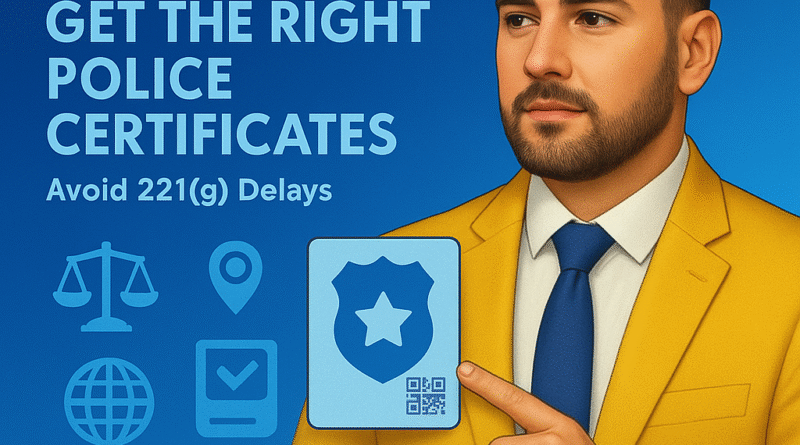Using Reciprocity Tables to Get the Right Police Certificates (No 221(g) Surprises)
Immigrant & Diversity Visas Police Certificates Reciprocity Tables
Goal: use the U.S. Department of State’s Reciprocity and Civil Documents tables to request the correct police certificate(s) for your case—no rejections, no delays.
What the reciprocity tables are (and why they matter)
The reciprocity tables—also called the Document Finder or Reciprocity by Country—are the U.S. government’s official, country-by-country instructions that tell you: (1) whether police certificates are available, (2) the exact issuing authority, (3) the document name that consular officers expect to see, (4) accepted formats/online portals, and (5) any exceptions or unavailability. For immigrant (IV) and diversity visa cases (DV), the police certificate rules are standardized, but the document itself is defined by your country’s page in this table.
Bottom line: If a police certificate is listed as available for your country and situation, you must obtain it exactly as described. If it’s listed as unavailable, you normally don’t submit it—but you should bring evidence/explanations to your interview.
When do you need police certificates?
For immigrant/DV processing, police certificates are required once you are 16 or older, based on where you have lived and for how long. The standard decision rules are:
| Scenario | Police certificate required from… |
|---|---|
| Age ≥ 16 and lived in your country of nationality for > 6 months (at any time) | Your country of nationality |
| Age ≥ 16 and lived in your current country of residence (different from nationality) for > 6 months | Your current country of residence |
| Lived in another country for ≥ 12 months (while you were ≥ 16) | That former country |
| Arrested anywhere (any age) | The city and/or country where you were arrested |
| Present/former residents of the U.S. | No U.S. police certificate required |
Police certificates generally expire in 2 years (unless issued by a country you no longer returned to after issuance). If yours will be older than two years on your interview date, plan to renew.
Visual rule-of-thumb (bar length ≈ frequency in real cases)
How to use the reciprocity tables (step-by-step)
Country snapshots: what the table actually looks like
Brazil (example)
- Availability: Police certificates are issued by states (most, but not the Federal District) for individuals ≥18; plus a Federal Police certificate.
- Document names: “Atestado/Certidão de Antecedentes Criminais” (State) and “Certidão de Antecedentes Criminais” (Federal).
- How many: For IV cases, provide a state certificate from each state you lived in for more than 6 months in the last five years plus the federal certificate.
- Notes: Some states offer online issuance; judicial-court “certidões” are not a substitute for police certificates.
India (example)
- Document name: Police Clearance Certificate (PCC) for residents; Statement of No Criminal Record for Indian passport holders abroad.
- Issuing authority: Regional Passport Office (in India) or the Indian Embassy/Consulate (abroad); FRRO for certain non-Indian residents.
- Tip: Schedule via Passport Seva/Kendra or your Indian mission; ensure the purpose is “immigration/visa.”
Philippines (example)
- Document name: NBI Clearance (blue, multi-purpose, annotated for travel abroad).
- Issuing authority: National Bureau of Investigation (NBI).
- Who needs it: Philippine-born IV applicants ≥16; foreign-born who resided ≥6 months can also request NBI per instructions.
Nigeria (example)
- Document name: Police Character Certificate.
- Issuing authority: Nigeria Police (Fingerprint Section). Older and newer formats are both acceptable.
- Tip: Ensure fingerprint-based issuance and the correct payment channel per the page.
Common mistakes that trigger checklists or 221(g)
- Wrong issuer (e.g., court certificate instead of the police certificate named in the table).
- Wrong jurisdiction (e.g., national certificate required but only a local city letter provided—or the reverse).
- Missing secondary certificates when a country requires both national and regional/state clearances.
- Expired certificate (older than 2 years or issued before a return to that country).
- Name mismatch (not accounting for name changes, multiple surnames, or single-name conventions). Add alias pages if available, and include proof of name changes.
- Not following the online portal listed on the page (officers often check issuance format/QR code/serial).
Quick Guide
• Open the reciprocity table ➜ pick country ➜ go to Police, Court, Prison Records → Police Certificates.
• Confirm Availability, Document Name, Issuing Authority, Procedure/Portal, Age limits, and exceptions.
• Apply exactly as written (same office/portal, same document title).
• Use the decision rules (6-month/12-month/arrest) to list every country you need.
• Upload readable scans to CEAC; bring originals to interview.
• If a certificate is listed as unavailable: select “Not available” in CEAC and prepare a statement; otherwise, expect the officer to require it.
FAQ
Do nonimmigrant (NIV) applicants need police certificates?
Generally, no. Police certificates are typically part of immigrant and diversity visa cases. Always follow post-specific instructions if you’re told to bring one for a particular NIV case.
How long is a police certificate valid?
Typically two years from issuance. If you return to the country after issuance, you may need a new one. Time your request so it is valid on your interview date.
What if the table says “Unavailable” for my country or region?
Then you generally do not submit a police certificate for that location. In CEAC, choose “Not available,” and include a short statement. Bring any supporting evidence to your interview.
Further reading:
My country issues both national and regional/state clearances. Which do I need?
Do exactly what your country’s page says. In some places, you need both national and regional/state police certificates.
Is a court record the same as a police certificate?
No. Court records document judicial proceedings; police certificates are law-enforcement clearances. Your reciprocity page will list each item separately.
What if I was arrested as a minor?
You must provide a police certificate from the place of arrest regardless of age at the time, plus any court/prison records if convicted, even if later pardoned.
Do I need translations or apostilles?
Provide a certified English translation if the document isn’t in English or the local language of the interview post. Apostilles are generally not required for consular review unless a post specifically requests them.
Can I use a “good conduct letter” from my employer or a local council?
No. Only the specific issuing authority and document named on the reciprocity page will be accepted.
My name changed after issuance. Do I need a new certificate?
Often yes—obtain a new certificate reflecting your current legal name, and bring evidence of the name change so the officer can reconcile identities.
CEAC shows “Missing” for my police certificate, but I uploaded it. Why?
Ensure you uploaded under the correct document slot, with a readable scan, and that the document matches what your reciprocity page describes. If it’s truly unavailable per the page, select “Not available” and include a statement.
Technical basis & official guidance
- Decision rules (who needs police certificates; 6-month/12-month/arrest logic), validity (2 years), no U.S. police certificates—see the Department of State’s immigrant/DV guidance and interview prep pages.
- Reciprocity tables (Document Finder) are the authority for the document name, issuing office, availability, and procedures.
- Unobtainable documents: When the reciprocity page lists a document as “Unavailable,” you generally do not submit it to NVC; otherwise, upload an explanation and the officer will decide at interview.
- Country pages show real-world specifics (e.g., Brazil state/federal split; India PCC issuers; Philippines NBI; Nigeria Police Character Certificate).
Checklist to avoid 221(g) delays
- ☑ Map every country that qualifies under the rules (nationality, current residence, former residence ≥12 months, arrest location).
- ☑ From the reciprocity page, copy the exact document name and issuing authority.
- ☑ Use the official portal if one is listed (keep receipt/QR code/serial).
- ☑ Time issuance so your certificate is < 2 years old at the interview.
- ☑ Upload clear, legible scans to CEAC; bring originals to interview.
- ☑ If the document is unavailable per the table, mark “Not available” and add a short statement of non-availability.
Mini-matrix: matching requests to the table
| Country example | Document name to request | Where to request | Key notes |
|---|---|---|---|
| Brazil | State “Atestado/Certidão de Antecedentes Criminais” + Federal “Certidão de Antecedentes Criminais” | State Secretaria de Segurança Pública + Federal Police portal | State certificate for each state lived > 6 months (last 5 years), plus federal certificate; Judicial court “certidões” are not substitutes. |
| India | Police Clearance Certificate (PCC) / Statement of No Criminal Record | Passport Office (India); Indian Embassy/Consulate (abroad) | Select the “immigration/visa” purpose; some applicants are routed via FRRO. |
| Philippines | NBI Clearance (multi-purpose, blue) | National Bureau of Investigation (NBI) — online or in-person | Philippine-born applicants ≥16 must furnish NBI; foreign-born residents (≥6 months) may also obtain NBI per page. |
| Nigeria | Police Character Certificate | Nigeria Police, Fingerprint Section | Older/newer formats acceptable; ensure proper fingerprinting and official fee channel. |
Pro tip: Before you pay a third-party agency, check if your reciprocity page lists an official online portal, fee, or appointment system. Officers prefer certificates that match the listed portal/format.
Final recommendations
- Start by mapping every country that triggers a certificate under the rules.
- Use the reciprocity table to create a shopping list: exact names, issuers, portals, and any special wording.
- Issue certificates close enough to interview to avoid staleness (but leave time for slow issuers).
- Keep digital copies, receipts, and tracking info; bring originals to interview.
- If something is truly unobtainable (as the table says), document that in CEAC and prepare to discuss at interview.
This guide is informational and does not replace post-specific instructions or legal advice. Always follow your country’s reciprocity page and your embassy/consulate’s interview notice.
Do you have any questions about this topic?
Join our legal community. Post your question and get guidance from other members.
⚖️ ACCESS GLOBAL FORUM
